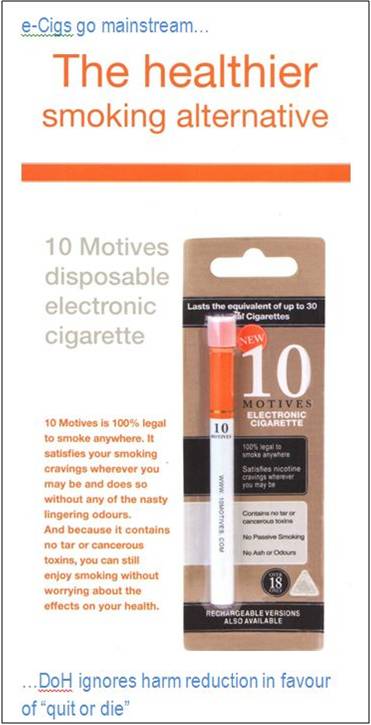The Department of Health is watching you!
Last week a number of bloggers focussed on the dishonest, authoritarian nature of the DoH. This is not news to those who have researched the ethically dubious behaviour of a government department that is the only one that admits to paying third parties to lobby government. The department’s track record on public health interventions in particular is justifiable only in the eyes of those whose narrow focus allows them to take the extremist position that “the end justifies the means” and therefore excuses behaviours that are otherwise unacceptable.
I and many others have previously highlighted the lack of objectivity that is a feature of DoH “consultations” and the fundamentally flawed approach that has seen the DoH directly funding social “scientists” to provide “evidence” to support public health policies such as smoking bans and minimum alcohol pricing. To any objective observer the processes and people involved in producing this policy based evidence undermine the credibility of the policies and of the DoH itself.
I have no reason to have confidence in the DoH and ample reason to be concerned about its agenda so I was rather alarmed to find out just how much control it has over GP practices. I recently attended my practice for a routine appointment and was surprised to find out that I had to answer a question about my smoking habits in order to check in using the automated system. I don’t smoke but as far as I am concerned, that together with my other lifestyle choices is information that I am prepared to share with my GP but do not necessarily wish to share with others.
The Orwellian and in my view unethical nature of this approach to information gathering prompted me to find out why a practice that has served my family well for decades has become increasingly impersonal and public health obsessed. I was alarmed to discover that the DoH is effectively paying GPs to ascertain the smoking status of everyone over 15 and that this is not the only way in which the relationship between patients and doctors is being depersonalised and centrally controlled.
The mechanism underlying this policy is called the Quality and Outcomes Framework (QoF). The QoF financially incentivises doctors to not only to gather lifestyle information but to treat patients based not on what might be best for a specific patient in a specific GPs experience but on what DoH /NICE centralists deem best practice. This potentially undermines the important GP/patient relationship and represents a major bureaucratic overhead.
The QoF is supposed to be voluntary but is in the Leninist tradition of the DoH is “voluntary” only if GPs can afford to forgo the state funding associated with it. In reality 98-99 % of practices participate as according to one well-placed source it is “almost unsustainable” for practices to opt out of providing this service.
The QoF was introduced by the previous government in 2004. Despite claiming that it wants to empower GPs and reduce paperwork, the current government has done nothing to mitigate either its centralist nature or its bureaucratic content. Each revision seems to be more demanding than the last and some GPs are of the opinion that some of the latest additions make it “unworkable and impractical”
The lifestyle information gathering aspects of QoF are alarming from a liberal perspective and are also likely to have negative consequences for doctor patient relations thanks to the intrusive and repetitive nature of the questioning involved. The government cannot claim to be unaware of this and other issues relating to QoF as medical organisations including the BMA claim to have raised it on more than one occasion.
In 2013 the QoF section on smoking has been changed from being a semi-reasonable attempt to ascertain the smoking status and offer quit services to people with problems such as emphysema, to a blanket demand for practices to catalogue the smoking habits of everyone over 15 years of age.
Alcohol consumption is likely to follow the same path and NICE /DoH have already decided on QoF targets for screening a subset of patients. As the subset includes anyone with high blood pressure it will be quite large, so scaling it up to all patients won’t be a problem at some future review.
The manner in which this information is being gathered, the people who see it and the way in which it is used by the DoH are all further cause for concern. It is one thing to share information with a GP who is bound by doctor patient confidentiality but another thing entirely to supply that information in a format that might be viewed by many other people who are not. Data is supposed to be “anonymised” before practices forward it to the DoH but some professionals are concerned that this may not always be the case in light of increasing government demands for general access to health records.
It is not difficult to imagine a near future scenario in which the DoH thinks it knows the lifestyle choices of the majority of us at an individual level and really is watching us. It is already watching our GPs rather too closely for comfort.
It would appear that whatever government is nominally representing us, it is powerful entrenched bureaucrats with centralist inclinations who dictate the health agenda. Perhaps we might be better off diverting resources to front line services rather than ring fencing DoH funding?
By Chris Oakley. Chris’ previous posts on Liberal Vision include: Minimum pricing – policy based evidence , Alcohol is Old News – Minimum Pricing for Digestives is the “Next Logical Step” , Soviet Style Alcohol Suppression Campaign Called for By Public Health Activists , Alcohol Taxation: The truth, the whole truth and nothing but the truth , Lies, damn lies, statistics &…
Tags: Department of Healt, GPs, QoF, Quality and Outcomes Framework, smoking



